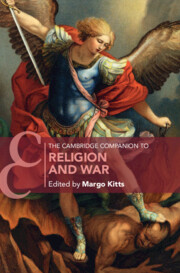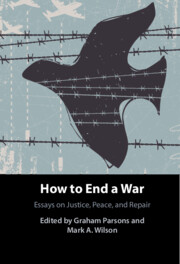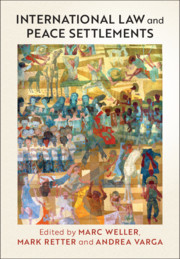Refine search
Actions for selected content:
17 results
Why Israel Should Protect, Supply and Rebuild Water Resources and Infrastructure in the Gaza Strip: Law, Ethics and Prudence
-
- Journal:
- Israel Law Review , First View
- Published online by Cambridge University Press:
- 09 October 2025, pp. 1-26
-
- Article
-
- You have access
- Open access
- HTML
- Export citation
7 - Peacemaking in Renaissance Europe
- from Part I - International Law in Renaissance Europe (1492–1660)
-
-
- Book:
- The Cambridge History of International Law
- Published online:
- 22 April 2025
- Print publication:
- 08 May 2025, pp 232-262
-
- Chapter
- Export citation
18 - Peacemaking in Old Regime Europe
- from Part II - International Law in Old Regime Europe (1660–1775)
-
-
- Book:
- The Cambridge History of International Law
- Published online:
- 22 April 2025
- Print publication:
- 08 May 2025, pp 588-619
-
- Chapter
- Export citation
International humanitarian law, jus post bellum and transformative justice
-
- Journal:
- International Review of the Red Cross / Volume 106 / Issue 927 / December 2024
- Published online by Cambridge University Press:
- 15 January 2025, pp. 1264-1286
- Print publication:
- December 2024
-
- Article
-
- You have access
- Open access
- HTML
- Export citation
Jus post bellum: Scope and assessment of the applicable legal framework
-
- Journal:
- International Review of the Red Cross / Volume 106 / Issue 927 / December 2024
- Published online by Cambridge University Press:
- 20 May 2024, pp. 1250-1263
- Print publication:
- December 2024
-
- Article
-
- You have access
- Open access
- HTML
- Export citation
13 - Buddhist Just War Traditions
- from Part II - Just War
-
-
- Book:
- The Cambridge Companion to Religion and War
- Published online:
- 04 May 2023
- Print publication:
- 11 May 2023, pp 283-296
-
- Chapter
- Export citation

The Cambridge Companion to Religion and War
-
- Published online:
- 04 May 2023
- Print publication:
- 11 May 2023
Chapter 10 - Reconciliation Is Justice – and a Strategy for Military Victory
-
-
- Book:
- How to End a War
- Published online:
- 02 March 2023
- Print publication:
- 09 March 2023, pp 194-214
-
- Chapter
- Export citation
Chapter 9 - Toward a Post Bellum Lieber Code
-
-
- Book:
- How to End a War
- Published online:
- 02 March 2023
- Print publication:
- 09 March 2023, pp 170-193
-
- Chapter
- Export citation

How to End a War
- Essays on Justice, Peace, and Repair
-
- Published online:
- 02 March 2023
- Print publication:
- 09 March 2023
But Is It Good Enough? Jus ad Vim and the Danger of Perpetual War
-
- Journal:
- Ethics & International Affairs / Volume 36 / Issue 4 / Winter 2022
- Published online by Cambridge University Press:
- 22 December 2022, pp. 527-537
-
- Article
-
- You have access
- Open access
- HTML
- Export citation
29 - Conclusion
- from Conclusion
-
-
- Book:
- International Law and Peace Settlements
- Published online:
- 14 January 2021
- Print publication:
- 04 February 2021, pp 685-704
-
- Chapter
- Export citation
24 - Financing Peace through Law?
- from Part V - Economic Aspects of Peace Settlements
-
-
- Book:
- International Law and Peace Settlements
- Published online:
- 14 January 2021
- Print publication:
- 04 February 2021, pp 545-572
-
- Chapter
- Export citation
1 - Introduction
-
-
- Book:
- International Law and Peace Settlements
- Published online:
- 14 January 2021
- Print publication:
- 04 February 2021, pp 1-28
-
- Chapter
- Export citation

International Law and Peace Settlements
-
- Published online:
- 14 January 2021
- Print publication:
- 04 February 2021
7 - Just War and Ordered Liberty
-
- Book:
- Just War and Ordered Liberty
- Published online:
- 08 January 2021
- Print publication:
- 07 January 2021, pp 176-199
-
- Chapter
- Export citation
Should humanitarian interveners promote democracy after genocide?
-
- Journal:
- International Theory / Volume 10 / Issue 1 / March 2018
- Published online by Cambridge University Press:
- 21 January 2018, pp. 1-30
-
- Article
-
- You have access
- Open access
- HTML
- Export citation
